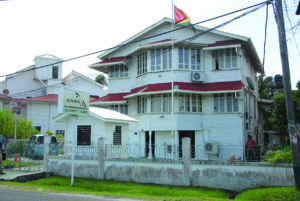
…as Broadcasting authority begins clamp down in Guyana
The Guyana National Broadcasting Authority (GNBA) has begun hauling in broadcasters for perceived breaches to the law and the Authority’s guidelines; with two of them being referred to the governing board for possible sanctions.
It is understood that the Special Investigative Committee of the GNBA conducted preliminary hearings with six delinquent broadcasters. According to a statement from GNBA, they were in breach of the Broadcasting Act of 2011 and published guidelines.
It is understood that the broadcasters flouted rules concerning good taste and decency and the broad-cast of obscene language in songs during prime-time hours. Since the passage of the Broadcast Amendment bill, GNBA has been vocal in warning broadcasters to become compliant with the law.
The Act empowers GNBA to pursue fines of up to G$1million and prison terms of one year for breach-es of the law. In its release, GNBA also warned that the Special Investigative Committee would contin-ue its crackdown on errant broadcasters. Besides recourse to the courts, the Authority in of itself has the power to cancel or suspend broadcast licences when necessary.
“The Authority stands vigorously against fundamental breaches of the broadcasting legislation, in an effort to ensure the national airwaves are reflective of local and international best practices in broad-casting, with due sensitivity to those vulnerable groups in our society and more so, adherence to our legal and social obligations.
The Authority’s Special Investigative Committee is poised to deliver on its mandate, and will continue to address these matters, in an assiduous manner,” the Authority warned.
“It is important to note that the power is vested in the Authority, through the Broadcasting Act of 2011, to suspend or cancel broadcast licences, as the Authority deems appropriate, following the nec-essary inquiries.
GNBA wishes to emphasise the fact that the Broadcasting Act, Section 30, provides recourse for broadcasters. Importantly, “a person aggrieved by a decision of the Authority, made un-der Section 28 and 29, may appeal in the same manner as if it were an order of a Magistrate, except that the appeal shall be made to the full Court of the High Court.”
Part two of the Act sets out that broadcast agencies would be mandated to broadcast public service programmes for a total of up to one hour daily. Broadcast agencies will be airing these public service programmes free of cost and as requested by the Government between 06:00h and 22:00h.
The Bill also states that the GNBA reserves the right to direct a broadcasting agency to broadcast emergency notices or disaster warnings for any length of time, and regularly during peak or prime ad-vertising time periods, depending on the nature of the emergency and having regard to public safety.
A broadcaster will have the right to file a complaint with the GNBA within 24 hours of being asked to broadcast a programme free of cost if, in the agency’s judgement, it is not considered a public service broadcast programme.
But there is a warning for broadcasters daring to oppose the legislation: the Bill states that any broad-caster the GNBA finds to have “arbitrarily refused” to broadcast a public service broadcast programme without lodging a complaint has committed an offence.
The Act also mandates that any licensed entity carrying out broadcast services immediately before the Act went into effect will have no choice but to reapply within 30 days for a licence in accordance with the amended law. Failing to reapply means a cessation of service.
On the other hand, failing to cease operations if not granted a new licence by the GNBA will, on sum-mary conviction, earn that broadcaster a fine of G$1 million and imprisonment of one year.
In addition, all machinery and equipment used for broadcasting by the entity can be seized.



